

Commentary Select
Commentary Select




Psalms, Proverbs: Cornerstone Biblical Commentary

Psalms, Proverbs: Cornerstone Biblical Commentary
Other features: Provides pastors, teachers, and students with up-to-date evangelical scholarship. Both exegetical and translation commentary. Part of an 18-volume collection. Features New Living Translation Text.
Mark D. Futato, Ph.D., The Catholic University of America, is Robert L. Maclellan Professor of Old Testament and academic dean at Reformed Theological Seminary in Florida. He is the author of several books and articles, including Beginning Biblical Hebrew and Interpreting the Psalms: An Exegetical Handbook. He has also contributed to The Spirit of the Reformation Study Bible and The New International Dictionary of Old Testament Theology and Exegesis. Dr. Futato is an ordained minister and served on the translation team for the book of Psalms in the New Living Translation.
George M. Schwabb, Sr., Ph.D., Westminster Theological Seminary, is associate professor of Old Testament at Erskine Theological Seminary in South Carolina. He is ordained in the Second Presbytery of the Associate Reformed Presbyterian Church and is a member of the Society of Biblical Literature and the Evangelical Theological Society. He has authored numerous scholarly publications, including Hope in the Midst of a Hostile World: The Gospel According to Daniel. He served as a reviewer for Psalms and the wisdom books for the New Century Version.
Reading the New Testament - 1 and 2 Corinthians

Reading the New Testament - 1 and 2 Corinthians
Paul's letters to the Christians in Corinth portray a young church struggling to live out the demands of the gospel amid the life of a thoroughly urban setting. In Reading Corinthians: A Literary and Theological Commentary, biblical scholar Charles Talbert helps his reader to grasp what was at stake in the conversations between Paul and the Corinthians. What we find there is not only a word for the struggling faithful in Corinth, but an always truthful word for the church today.
"Reading Corinthians makes an excellent companion for those who want to study in a thorough fashion one of the most revealing of Paul's letters." — The Bible Today
"This excellent piece of work should be of great value to undergraduates and seminarians as well as pastors and professors." — Religious Studies Review
"Talbert's successful experience as a teacher and pastor provides focus for his commentary so that he fulfills admirably the design of this volume, appealing to the nonspecialist, the informed lay person, the college or seminary student. To these audiences I would heartily recommend Reading Corinthians as a reliable guide to understanding Corinthians."— Catholic Biblical Quarterly
Charles H. Talbert is Distinguished Professor of Religion at Baylor University in Waco, Texas. He is the author of several other commentaries in this series, including Reading Luke, Reading John, and Reading Acts. He is also the author of Romans in the Smyth & Helwys Bible Commentary series.
Edited by Charles H. Talbert, the Reading the New Testament Commentary Series presents cutting edge biblical research in accessible language that is both coherent and comprehensive.
Reading the New Testament - 1 Peter, Jude, and 2 Peter
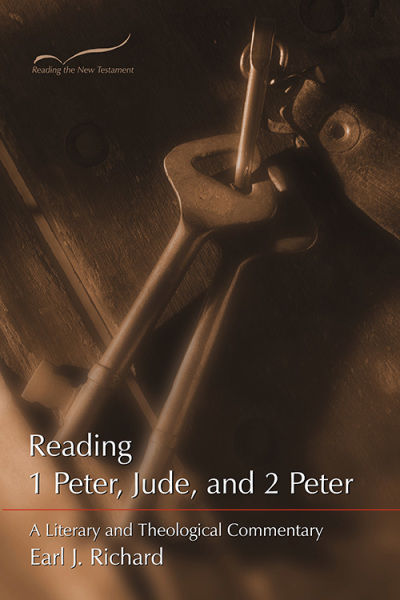
Reading the New Testament - 1 Peter, Jude, and 2 Peter
Reading 1 Peter, Jude, and 2 Peter: A Literary and Theological Commentary is dedicated to the study of three late, little-known biblical works that historically have been relegated to the lesser works of the New Testament. Reading 1 Peter, Jude, and 2 Peter underscores the light that these letters shed upon one another and focuses on the snapshots they provide of early Christian communities as they encountered the social and religious environment in which they were situated.
Careful reading of 1 Peter reveals the complex world of the post-apostolic period. Jude and 2 Peter provide a sober look at the early community's evolution in doctrinal and moral terms.
Earl J. Richard is Professor of New Testament at Loyola University in New Orleans. He holds graduate degrees in theological and biblical studies from the University of Ottawa, Johns Hopkins University, and the Catholic University of America. He is the author of many books in the area of biblical studies, past president of the Society of Biblical Literature (southeast region), and a member of the Catholic Biblical Association.
Edited by Charles H. Talbert, Distinguished Professor of Religion at Baylor University in Waco, Texas, the Reading the New Testament Commentary Series presents cutting edge biblical research in accessible language that is both coherent and comprehensive.
You can also purchase the entire Reading the New Testament 13 volume commentary series from Olive Tree.
Reading the New Testament - Acts

Reading the New Testament - Acts
Answers to the usual introductory questions do not yield sufficient harvest to enable an intelligent reading of Acts. The approach of Reading Acts: A Literary and Theological Commentary is to ask how ancient Mediterranean auditors would have heard Acts when it was read in their presence. To be successful Talbert divides this approach into two parts— how Acts would have been heard in its precanonical context and in its canonical context.
Charles H. Talbert is Distinguished Professor of Religion at Baylor University in Waco, Texas. He is the Reading the New Testament commentary series editor and the author of several of the editions in the series, including Reading Luke, Reading John, and Reading Corinthians.
Edited by Charles H. Talbert, the Reading the New Testament Commentary Series presents cutting edge biblical research in accessible language that is both coherent and comprehensive.
You can also purchase the entire Reading the New Testament 13 volume commentary series from Olive Tree.
Reading the New Testament - Colossians, Ephesians, and 2 Thessalonians
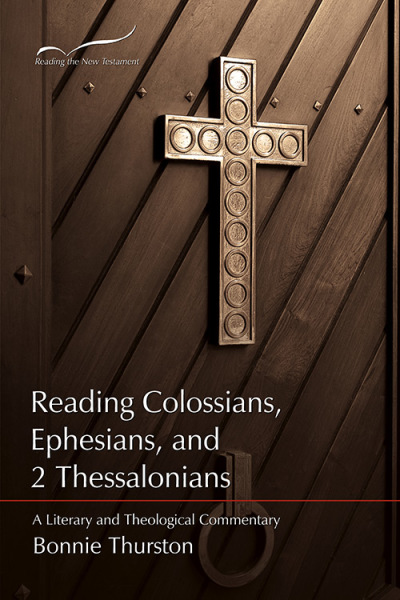
Reading the New Testament - Colossians, Ephesians, and 2 Thessalonians
Like other volumes in this unique series, Reading Colossians, Ephesians, & 2 Thessalonians: A Literary and Theological Commentary focuses on comprehending the major themes of the epistles and their relationship to the understanding of the early Christian communities. With the focus on the work in its entirety rather than a verse-by-verse methodology, this volume will appeal to the professional and nonprofessional alike, as well as to college and seminary students.
Bonnie Thurston is professor of religion at Pittsburgh Theological Seminary in Pittsburgh, Pennsylvania.
Edited by Charles H. Talbert, Distinguished Professor of Religion at Baylor University in Waco, Texas, the Reading the New Testament Commentary Series presents cutting edge biblical research in accessible language that is both coherent and comprehensive.
Reading the New Testament - Galatians, Philippians, and 1 Thessalonians

Reading the New Testament - Galatians, Philippians, and 1 Thessalonians
Cousar interprets three letters of Paul, each of which shows him in a different light. In Galatians, the apostle contends for the gospel against a group of Jewish Christian missionaries who have come into the congregation. In Philippians, Paul addresses his favorite community in intimate terms to offer thanks for a gift they have sent him and to urge them to maintain unity in the face of opposing forces. 1 Thessalonians, Paul's earliest letter, is written to encourage the congregation in that city to lead lives worthy of the gospel.
The commentary traces the movement of the letters, paragraph by paragraph, and pays particular attention to the literary character of the writing, and to the theological implications of the text for the church today.
Charles B. Cousar is the Samuel A. Cartledge Professor of New Testament at Columbia Theological Seminary, Decatur, Georgia. He is the author of Galatians (Interpretation); Theology of the Cross, Texts for Preaching: A Lectionary Commentary based on the NRSV and The Letters of Paul.
Edited by Charles H. Talbert, Distinguished Professor of Religion at Baylor University in Waco, Texas, the Reading the New Testament Commentary Series presents cutting edge biblical research in accessible language that is both coherent and comprehensive.
You can also purchase the entire Reading the New Testament 13 volume commentary series from Olive Tree.
Reading the New Testament - Hebrews and James

Reading the New Testament - Hebrews and James
Reading Hebrews and James: A Literary and Theological Commentary provides a clear path through the unique and often divisive Letter to the Hebrews and Letter of James. Isaacs's commentary on these two letters expertly considers questions of authorship and historical context while also making both Hebrews and James undeniably relevant for today's faith. Preachers and teachers alike will benefit from the essential study that Reading Hebrews and James offers.
Marie E. Isaacs is head of the Department of Biblical Studies in Heythrop College, London, England. Her publications include The Concept of Spirit: Pneuma in Hellenistic Judaism and its Bearing on the New Testament and Sacred Space: An Approach to the Theology of the Epistle to the Hebrews.
"Marie E. Isaacs provides valuable and original readings of Hebrews and James that reveal the historical, literary, and religious contexts and messages of the books. Especially productive is her suggestion that Hebrews is written to Jewish Christians who had continued to worship in the Temple in Jerusalem and who were devastated by the destruction of the Temple in 70 C.E". — Edgar V. McKnight, Research Professor and William R. Kenan, Jr. Professor Emeritus of Religion, Furman University
"Brief yet insightful, cautious yet judicious in weighing alternative interpretations, Marie Isaacs leads Christian interpreters to a fresh appreciation for two of the most enigmatic books of the New Testament. Hebrews and James are as vital for Christian instruction today as ever before. Students, pastors, and Bible study groups will find here an engaging guide for further, focused study of these letters." — Alan Culpepper, Dean / McAfee School of Theology
Edited by Charles H. Talbert, Distinguished Professor of Religion at Baylor University in Waco, Texas, the Reading the New Testament Commentary Series presents cutting edge biblical research in accessible language that is both coherent and comprehensive.
You can also purchase the entire Reading the New Testament 13 volume commentary series from Olive Tree.
Reading the New Testament - John and Johannine epistles
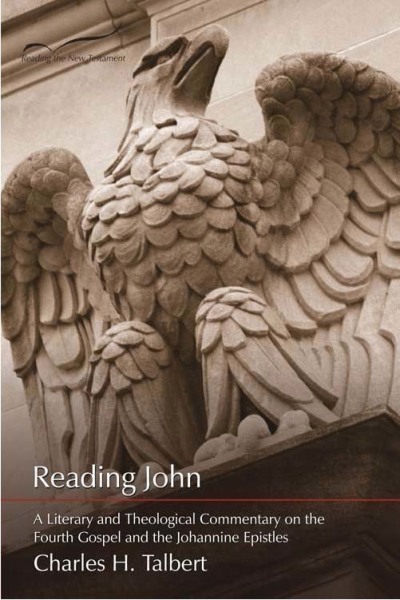
Reading the New Testament - John and Johannine epistles
Reading John: A Literary and Theological Commentary on the Fourth Gospel and Johannine Epistles concentrates on the literary and theological distinctives of the Fourth Gospel and the Johannine Epistles. New Testament scholar Charles Talbert's unique commentary considers the entire scope of these works attributed to John, their literary settings and particularities, and their continuing theological importance to the Christian story. Thoughtful and engaging, Reading John is an essential book for students and ministers studying the New Testament and the Johannine writings.
Charles H. Talbert is Distinguished Professor of Religion at Baylor University in Waco, Texas. He is the Reading the New Testament commentary series editor and the author of several of the editions in the series, including Reading Luke, Reading Acts, and Reading Corinthians.
Talbert's commentary maintains the special focus that keeps this series from just rehasing the more thorough classic commentaries.It is an original, very close reading of the final form of the Gospel and Letters of John for their religious content, in light both of ancient Greco-Roman, Jewish, and Christian writings, and of present-day pastoral concerns...[A] commendable work of mature scholarship. — Theological Studies
It pleases me to see the announcement of a revision of Talbert’s already excellent analysis of John. What impresses me is definitely his close reading of the original text, coming up with fresh and acute insights. He is not content to state the obvious and revisit the commonplace. He finds new light. Dr. Talbert will inform the student and inspire the preacher with perspectives freshly found. — Peter Rhea Jones, Professor of Preaching and New Testament, McAfee School of Theology Mercer University
Edited by Charles H. Talbert, the Reading the New Testament Commentary Series presents cutting edge biblical research in accessible language that is both coherent and comprehensive.
You can also purchase the entire Reading the New Testament 13 volume commentary series from Olive Tree.
Reading the New Testament - Luke

Reading the New Testament - Luke
Reading Luke: A Literary and Theological Commentary on the Third Gospel concentrates on the literary and theological distinctives of the third Gospel. Charles Talbert’s effective and insightful commentary enables its reader to see and feel the full force of the literary masterpiece that begins the Christian story in the birth of Jesus Christ and continues in the Acts of the Apostles. Reading Luke is an essential book for students and ministers studying Luke-Acts.
Charles Talbert is Distinguished Professor of Religion at Baylor University in Waco, Texas. He is the Reading the New Testament commentary series editor and the author of several of the editions in the series, including Reading Acts, Reading John, and Reading Corinthians. He is also the author of Romans in the Smyth & Helwys Bible Commentary series.
"Charles Talbert, perhaps the foremost interpreter of Luke-Acts among biblical scholars in the United States, has produced an unusual and highly readable commentary. Reading Luke will reward every serious student of Luke-Acts with an abundance of astute observations and insights." — Faith & Mission
Edited by Charles H. Talbert, the Reading the New Testament Commentary Series presents cutting edge biblical research in accessible language that is both coherent and comprehensive.
You can also purchase the entire Reading the New Testament 13 volume commentary series from Olive Tree.
Reading the New Testament - Mark

Reading the New Testament - Mark
In Reading Mark: A Literary and Theological Commentary on the Second Gospel, Dowd examines the Gospel of Mark from literary and theological perspectives, suggesting what the text may have meant to its first-century audience of Gentile and Jewish Christians. Mark is a Greco-Roman biography of Jesus written in an apocalyptic mode. Its theology is based on the message of the prophet Isaiah— the proclamation of release from bondage and a march toward freedom along the "way of the Lord."
Sharyn Dowd is an associate professor of religion at Baylor University, Waco, Texas.
Edited by Charles H. Talbert, Distinguished Professor of Religion at Baylor University in Waco, Texas, the Reading the New Testament Commentary Series presents cutting edge biblical research in accessible language that is both coherent and comprehensive.
You can also purchase the entire Reading the New Testament 13 volume commentary series from Olive Tree.
Reading the New Testament - Matthew

Reading the New Testament - Matthew
Reading Matthew: A Literary and Theological Commentary provides thorough guidance through Matthew's story of Jesus. Garland's commentary reveals the movement of the story's plot while also highlighting the theology of Matthew. Reading Matthew is an essential book for students and ministers studying the first Gospel.
"Garland's commentary is an eminently worthy addition to this series. Following a brief but instructive introduction in which he deals with such matters as the various reasons for which Matthew wrote his Gospel, Garland confidently guides the reader through Matthew's story of Jesus. Commenting on the text section by section, Garland apprises the reader of the movement of the story's plat and highlights through the theology that Matthew conveys through the art form of narration. Pastors and students will not only benefit greatly from this commentary but will also applaud both the incisvieness of Garland's comments and the clarity of his prose." — Jack Dean Kingsbury, Aubrey Lee Professor of Biblical Theology, Union Theological Seminary in Virginia
David E. Garland is professor of religion at Baylor University in Waco, Texas.
Edited by Charles H. Talbert, Distinguished Professor of Religion at Baylor University in Waco, Texas, the Reading the New Testament Commentary Series presents cutting edge biblical research in accessible language that is both coherent and comprehensive.
You can also purchase the entire Reading the New Testament 13 volume commentary series from Olive Tree.
Reading the New Testament - Philemon, Titus, and 1 & 2 Timothy
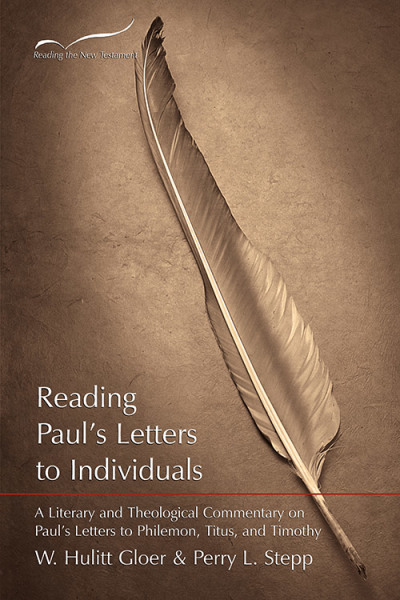
Reading the New Testament - Philemon, Titus, and 1 & 2 Timothy
In Reading Paul's Letters to Individuals: A Literary and Theological Commentary, Gloer and Stepp interpret Paul’s letter to Philemon and the Pastoral Epistles—Titus and 1 & 2 Timothy. Philemon tells a simple and straight-forward story of Philemon and his escaped slave Onesimus. How can the story of an escaped slave returned to his master hold any meaning for believers today? Indeed, in Philemon we encounter a practical working out of Paul’s foundational theological ideas—grace, faith, atonement, reconciliation, freedom in Christ, new creation, and the ethical life that stems from these.
In their study of the Pastoral Epistles, Gloer and Stepp describe the continuation of Paul’s missionary work, the internal and external conflicts, and Paul’s gradual withdrawal from the work that has defined his life. In Paul’s absence, how will the churches address the conflicts and persecution? They survive and thrive by trusting the successors that Paul provided for them.
Like other volumes in this unique series, Reading Paul’s Letters to Individuals focuses on comprehending the major themes of the epistles and their relationship to the understanding of the early Christian communities. With the focus on the work in its entirety rather than a verse-by-verse methodology, this volume will appeal to the professional and nonprofessional alike, as well as to college and seminary students.
W. Hulitt Gloer (Ph. D., Southern Baptist Theological Seminary) is professor of Preaching and Christian Scripture at Baylor University’s George W. Truett Theological Seminary. In addition to his extensive service as a pastor and professor, Dr. Gloer is the author of As You Go: An Honest Look at Jesus' First Disciples and An Exegetical and Theological Study of Paul's Understanding of New Creation and Reconciliation in 2 Cor. 5:14-21. Gloer and his wife, Sheila, have two adult sons, Jeremy and Joshua.
Perry L. Stepp (Ph.D., Baylor University) is a professor of Biblical Studies and Theology and the Dean of the Sack School of Bible & Ministry at Kentucky Christian University. He is also the author of Leadership Succession in the World of the Pauline Circle and several articles on New Testament themes. His focus as a scholar is on exploring the theological content of New Testament texts by the application of tools from literary criticism, ancient and modern. In addition to his academic work, he has pastored several churches in the Midwest and Southwest.
The decision to set apart the Pauline letters to individuals is itself immediately interesting and effective in giving these epistles a distinctive place. These commentaries reflect current scholarship such as rhetorical criticism and story/characters and social historical studies. Both primary sources and good modern analyses are interspersed effectively. Words are not wasted, making the commentaries accessible. The reader is rewarded. Clarity and brevity speak well for themselves in these lively commentaries. —Peter Rhea Jones, Gannon Professor of Preaching and Professor of New Testament, McAfee School of Theology, Mercer University
Edited by Charles H. Talbert, Distinguished Professor of Religion at Baylor University in Waco, Texas, the Reading the New Testament Commentary Series presents cutting edge biblical research in accessible language that is both coherent and comprehensive.
You can also purchase the entire Reading the New Testament 13 volume commentary series from Olive Tree.
Reading the New Testament - Revelation

Reading the New Testament - Revelation
"Trafton has produced a clear, understandable, insightful reading of the book of Revelation - not an easy task for a book that has left many readers puzzled and confused. One of the particular strengths of Trafton's commentary is his close attention to the structure of John's work and the internal connections between various passages of the book. Readers will also benefit from Trafton's identification of John's extensive indebtedness to the Hebrew Bible for much of his imagery and ideas." — Mitchell G. Reddish, O.L. Walker Professor of Christian Studies and Chair, Department of Religious Studies, Stetson University
Joseph L. Trafton is Distinguished University Professor of Religious Studies at Western Kentucky University in Bowling Green, Kentucky. He has written extensively on Second Temple Judaism and serves as a contributor to the Princeton Theological Seminary Dead Sea Scrolls Project.
Edited by Charles H. Talbert, Distinguished Professor of Religion at Baylor University in Waco, Texas, the Reading the New Testament Commentary Series presents cutting edge biblical research in accessible language that is both coherent and comprehensive.
Reading the New Testament - Romans

Reading the New Testament - Romans
The Epistle to the Romans is considered to be the classic of Reformation theology. Luke Timothy Johnson, a scholar from the Roman Catholic tradition, invests this commentary with breadth of perspective and clarity of expression. He focuses on understanding the key themes and their relationship to the whole of Pauline writings and the shaping of Christianity.
Luke Timothy Johnson is the R.W. Woodruff professor of New Testament and Christian Origins at the Candler School of Theology at Emory University in Atlanta, Georgia.
Edited by Charles H. Talbert, Distinguished Professor of Religion at Baylor University in Waco, Texas, the Reading the New Testament Commentary Series presents cutting edge biblical research in accessible language that is both coherent and comprehensive.
You can also purchase the entire Reading the New Testament 13 volume commentary series from Olive Tree.
Reading the Old Testament: Reading Deuteronomy (RtOT)
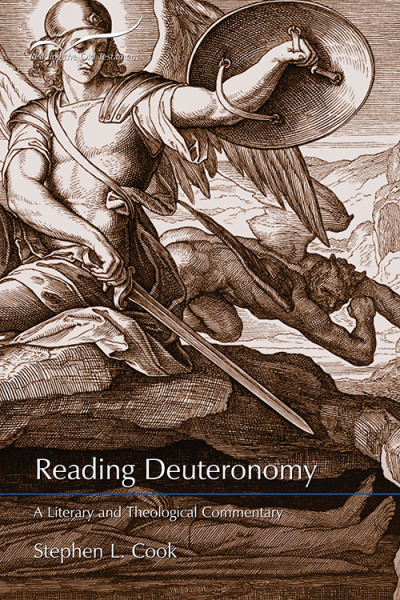
Reading the Old Testament: Reading Deuteronomy (RtOT)
A lost treasure for large segments of the modern world, the book of Deuteronomy powerfully repays contemporary readers’ attention. It represents Scripture pulsing with immediacy, offering gripping discourses that yank readers out of the doldrums and back to Mount Horeb and an encounter with divine Word issuing forth from blazing fire.
God’s presence and Word in Deuteronomy stir deep longing for God and move readers to a place of intimacy with divine otherness, holism, and will for person-centered community. The consistently theological interpretation reveals the centrality of Deuteronomy for faith and powerfully counters critical accusations about violence, intolerance, and polytheism in the book.
Reviews
"Stephen Cook’s new commentary on Deuteronomy captures the reforming spirit of this biblical book. With his own fresh and dynamic voice, Cook unleashes the forceful, commanding voice of Deuteronomy. Read in light of Cook’s long and deep scholarship, Deuteronomy emerges as a powerful source for theological reflection for the church today. Most highly recommended for courses in seminaries, divinity schools, and programs in theology." - Mark S. Smith, Skirball Professor of Bible and Ancient Near Eastern Studies, New York University
"Stephen Cook’s new theological commentary puts Deuteronomy’s compelling reinterpretation of an earlier minority tradition in ancient Israel in lively dialogue with other like-minded representatives of this “outsider” stream of tradition within the Old Testament (Hosea, Micah, Jeremiah, Malachi, the Elohist, Psalms of Asaph, Joshua–2 Kings). All this is done in service to Cook’s overall aim to bring out the “vibrant liveliness and pressing relevance” of Deuteronomy as a resource for constructive theological formation for contemporary people of faith today. An insightful and accessible study of the theology and ethics of Deuteronomy." — Dennis Olson, Charles T. Haley Professor of Old Testament Theology Chair, Biblical Studies Department, Princeton Theological Seminary
"Stephen L. Cook provides an accessible yet profound theological commentary on the theologically rich book of Deuteronomy. Often thought-provoking and always insightful, Cook’s contribution illumines the ancient biblical text so modern readers, particularly lay and clergy, can come to a deeper understanding not only of the book itself but also of the God who reveals himself through it." — Tremper Longman III, Robert H. Gundry Professor of Biblical Studies, Westmont College
Stephen L. Cook serves as the Catherine N. McBurney Professor of Old Testament Language and Literature at Virginia Theological Seminary. He did his doctoral training in Old Testament at Yale after having earning the M.Div. degree at Yale’s Divinity School. Stephen has served in several capacities as an officer of the Society of Biblical Literature and is currently chair of the executive committee, the Catholic Biblical Association, Baltimore-Washington Region.
Edited by Mark E. Biddle, Russell T. Cherry Professor of Hebrew Bible/Old Testament at Baptist Theological Seminary at Richmond, the Reading the Old Testament commentary series presents cutting-edge biblical research in accessible language.
Reading the Old Testament: Reading Ezekiel (RtOT)
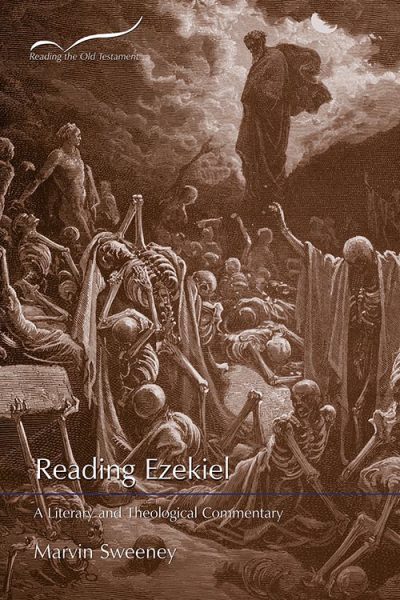
Reading the Old Testament: Reading Ezekiel (RtOT)
In this new volume in the Reading the Old Testament commentary series, biblical scholar Marvin A. Sweeney considers one of the most interesting and compelling books of the Hebrew Bible. Ezekiel is simultaneously one of the Bible’s most difficult and perplexing books as it presents the visions and oracles of Ezekiel, a Judean priest and prophet exiled to Babylonia in the sixth century BCE.
The book of Ezekiel points to the return of YHWH to the holy temple at the center of a reconstituted Israel and creation at large. As such, the book of Ezekiel portrays the purging of Jerusalem, the Temple, and the people, to reconstitute them as part of a new creation at the conclusion of the book. With Jerusalem, the Temple, and the people so purged, YHWH stands once again in the holy center of the created world. As Sweeney writes in his introduction, the book of Ezekiel ultimately represents “a profound attempt to encounter the holy in the profane world, and based on that encounter, to sanctify the world in which we live.”
Marvin A. Sweeney is Professor of Hebrew Bible at the Claremont Lincoln University and Claremont School of Theology and Professor of Bible and Faculty Chair at the Academy for Jewish Religion, California, where he teaches courses in Hebrew Bible and the History of Judaism and Jewish Thought. He holds the Ph.D. and M.A. in Religion from the Claremont Graduate School and the A.B. in Political Science and Religious Studies (with distinction) from the University of Illinois. He has also studied at the Princeton Theological Seminary, the Hebrew University of Jerusalem, and Brandeis University. He is the author of twelve volumes, including Tanak: A Theological and Critical Introduction to the Jewish Bible, Reading the Hebrew Bible after the Shoah: Engaging Holocaust Theology, and The Prophetic Literature. He has written more than 100 articles and 550 reviews.
Edited by Mark E. Biddle, Russell T. Cherry Professor of Hebrew Bible/Old Testament at Baptist Theological Seminary at Richmond, the Reading the Old Testament com- mentary series presents cutting-edge biblical research in accessible language.
Reading the Old Testament: Reading Genesis (RtOT)
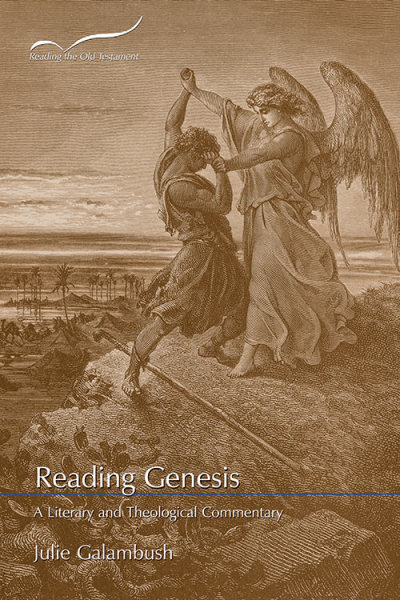
Reading the Old Testament: Reading Genesis (RtOT)
Genesis, a book of wondrous stories, is also a profound exploration of the human condition. From Cain and Abel to Joseph and his brothers, the narrative focuses on the corrosive effects of envy and resentment. Ultimately, it shows a path toward reconciliation.
Julie Galambush applies current historical, archaeological, and literary scholarship to create a nuanced and highly accessible commentary, explaining the history behind the writing of Genesis, the customs and laws that “went without saying” for ancient readers, and even the puns that enrich the original Hebrew but are lost in translation. She also addresses the challenges facing contemporary Jews and Christians who accept Genesis as sacred Scripture but reject practices the Genesis authors readily accepted, such as slavery and the “gifting” of women as concubines. Reading Genesis invites any reader, religious or otherwise, to listen in and to join in on this ancient conversation on what it means to be human.
Julie Galambush is Walter G. Mason Distinguished Associate Professor of Religious Studies, Emerita, at The College of William & Mary. She holds bachelor of arts and master of divinity degrees from Yale University and a doctorate in Old Testament Studies from Emory University and is a frequent lecturer in churches and synagogues.
Edited by Mark E. Biddle, Russell T. Cherry Professor of Hebrew Bible/Old Testament at Baptist Theological Seminary at Richmond, the Reading the Old Testament commentary series presents cutting-edge biblical research in accessible language.
Reviews
"Reading Genesis is an amazing piece of work with a literary flair par excellence. It is readily accessible to all readers, with new insights even for trained scholars as well. It is rich in information, including comparative material from the ancient Near Eastern world, that is sure to enlighten all readers. Galambush’s feminist concerns and insights also shine through as she raises the women in Genesis to prominence. A must read for everyone interested in understanding Genesis!" — Kah-Jin Jeffrey Kuan President and Professor of Hebrew Bible, Claremont School of Theology
"Julie Galambush is a gifted and engaging teacher. Her new introduction to the book of Genesis engages the complexities of that notoriously difficult book with clarity, scholarly skill, humanity, and a welcome sense of humor." — Barbara Nevling Porter, Research Associate Harvard Semitic Museum and Director of the Casco Bay Assyriological Institute
"Reading Genesis is a learned, beautifully written commentary that is truly for every serious reader of the Bible. It speaks to the reader who is searching for spiritual insight without compromising an iota of serious scholarship. Julie Galambush knows the field of contemporary Bible studies as well as the traditional commentaries. Most of all, Dr. Galambush is a careful reader who knows how to go deeply into the text’s many layers." — Rabbi Daniel G. Zemel, Temple Micah, Washington, DC
Reading the Old Testament: Reading Hosea - Micah (RtOT)
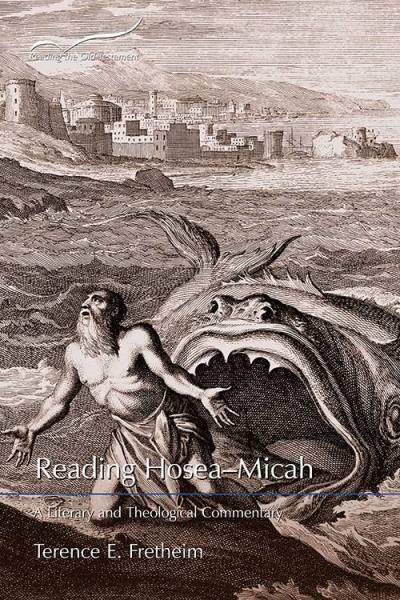
Reading the Old Testament: Reading Hosea - Micah (RtOT)
In this volume in the Reading the Old Testament commentary series, Terence E. Fretheim explores themes of indictment, judgment, and salvation in Hosea–Micah. The indictment against the people of God especially involves issues of idolatry, as well as abuse of the poor and needy. The effects of such behaviors are often horrendous in their severity. While God is often the subject of such judgments, the consequences, like fruit, grow out of the deed itself. Issues of indictment and judgment are not finally ends in themselves, but in the service of the salvation of God.
Review
"The Smyth & Helwys series is a perfect venue for Fretheim’s interpretive skills. He is among the best readers of texts now at work, and here his consummate skill is everywhere evident. In addition to the nuts and bolts of historical criticism that he handles succinctly, he moves readily into the rhetorical strategies performed in the text and finally to his forte of theological interpretation. His exposition is a welcome and reliable probe of difficult texts that continue, he makes clear, to insist upon their own compelling contemporaneity." — Walter Brueggemann, Columbia Theological Seminary
Terence E. Fretheim is Elva B. Lovell Professor of Old Testament Emeritus at Luther Seminary in St. Paul, Minnesota. He graduated from Luther College (BA, 1956), Luther Theological Seminary (BD, 1960), and Princeton Theological Seminary (PhD, 1967). He has taught at Augsburg College and Theological Seminary (1961–1963, 1967–1968) and Luther Seminary (1968–2013). Through the years he has taught for shorter periods of time at several theological schools in the US and also abroad (Malaysia; Hong Kong; Cairo). He has been a speaker at numerous church gatherings across the country. He is the author of 23 books, including Jeremiah in the Smyth & Helwys Bible Commentary Series.
Reading the Old Testament: Reading Isaiah (RtOT)
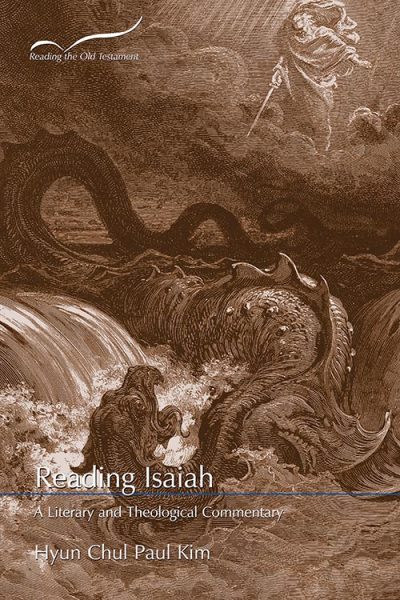
Reading the Old Testament: Reading Isaiah (RtOT)
In this commentary, Hyun Chul Paul Kim brings together innovative interpretive approaches and the proposals of various scholars to interpret the book of Isaiah in light of the ancient literature/culture, intertextual allusions/correlations, and socio-historical contexts of the empires. While closely exegeting key issues of each chapter, the commentary also explores interpretive relevance and significance between ancient texts and the modern world. Engaging with theological messages of the book of Isaiah as a unified whole, the commentary will both illuminate and inspire readers to wrestle with its theological implications for today’s church and society.
Review
"Hyun Chul Paul Kim presents a compelling commentary on the book of Isaiah, a book that would be considered politically incorrect in our contemporary world. He deftly combines the details of a diachronic, or historical, analysis of the various elements of the book with an overarching synchronic, or literary, perspective that unites the book as a whole. His work is fundamentally intertextual in that it explores the relationships between Isaiah and ancient and contemporary worlds. This accessible commentary will both prompt and enable students to engage this endlessly fascinating book. — Marvin A. Sweeney, Professor of Hebrew Bible, Claremont School of Theology, Claremont, California, Professor of Tanak, Academy for Jewish Religion California, Los Angeles, California
Hyun Chul Paul Kim is the Harold B. Williams Professor of Hebrew Bible at Methodist Theological School in Ohio. He is the co-author of You Are My People: An Introduction to Prophetic Literature and co-editor of The Desert Will Bloom: Poetic Visions in Isaiah, Formation and Intertextuality in Isaiah 24–27, and Concerning the Nations: Essays on the Oracles against the Nations in Isaiah, Jeremiah and Ezekiel. A former co-chair of the Formation of the Book of Isaiah group at SBL and a recent Fulbright U.S. Scholar to Korea, he is currently a co-chair of the Intertextuality and the Hebrew Bible consultation at SBL.
Reading the Old Testament: Reading Jeremiah (RtOT)
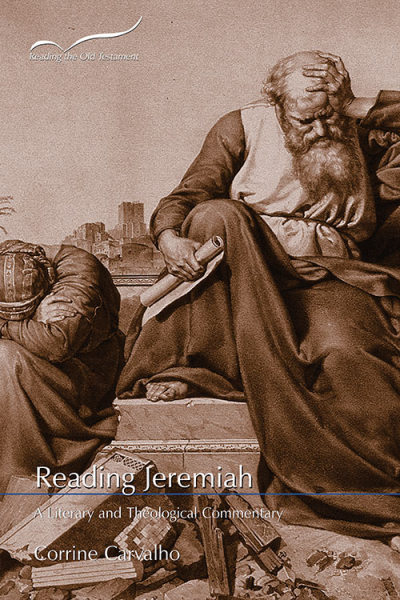
Reading the Old Testament: Reading Jeremiah (RtOT)
In this new volume from the Reading the Old Testament commentary series, biblical scholar Corrine Carvalho explores the book of Jeremiah—where books are burned in the palace and the temple is a jail. Reflecting the ways that communal tragedy permeates communal identity, the book of Jeremiah as literary text embodies the confusion, disorientation, and search for meaning that all such tragedy elicits. Just as the fall of Jerusalem fractured the Judean community and undercut every foundation on which it built its identity, so too the book itself (or more properly, the scroll) jumbles images, genres, and perspectives.
Carvalho’s study of the book of Jeremiah engages the text as a collection of literature. To be sure, some of this literature has roots in oral performance, but it comes down to us as a written text. It is a complex collection, however, with little inherent cohesion. In fact, it has been preserved in two different arrangements, one found in the Hebrew version and the other in the Greek. Both versions presume that the audience hears this material against a particular historical backdrop. This book fleshes out Jeremiah’s historical horizon, but it does so in order to clarify the literature rather than as an end in itself.
Corrine Carvalho is a professor in the theology department at the University of St. Thomas in St. Paul, Minnesota. In 1991, she earned her PhD from Yale, where she specialized in the Hebrew Bible and Old Testament studies. She also has a MA in Old Testament from the Graduate Theological Union in Berkeley, California, and a BA in Latin from the University of San Francisco, where she graduated magna cum laude.
Edited by Mark E. Biddle, Russell T. Cherry Professor of Hebrew Bible/Old Testament at Baptist Theological Seminary at Richmond, the Reading the Old Testament commentary series presents cutting-edge biblical research in accessible language.
Reading the Old Testament: Reading Job (RtOT)
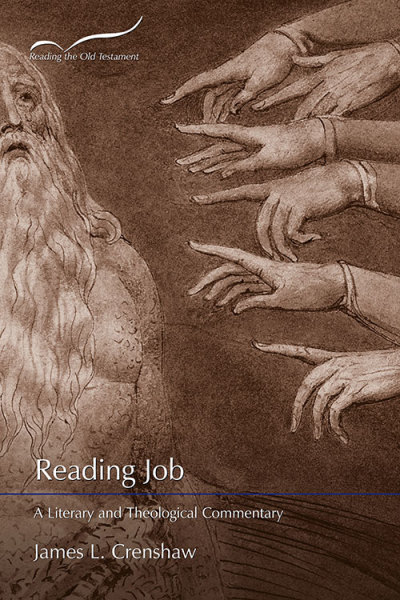
Reading the Old Testament: Reading Job (RtOT)
At issue in the Book of Job is a question with which most all of us struggle at some point in life, “Why do bad things happen to good people?” James Crenshaw has devoted his life to studying the disturbing matter of theodicy—divine justice—that troubles many people of faith. Few individuals come from reading Job unmoved. If they seek answers, they likely will be disappointed. And, many find the depiction of God troubling. If God were merely to meet our expectations, the Creator would hardly be anything more than our own projections into the heavens. Perhaps the ancient poet serves readers best by starkly portraying the brutal reality that life and this world are not fair, and that justice is a human project.
Reviews
"Crenshaw's study of Job is rich in insight and a brilliant contribution to scholarship. As a renown scholar in the interpretation of wisdom texts, this volume should be found on the bookshelves of every biblical scholar who is interested in wisdom literature and the interpretation of Job." — Leo G. Perdue, Brite Divinity School
"Excellent commentaries on Job abound; Jim Crenshaw’s 'reading' of Job adds to the list and raises the bar. If contemporary readers wish to enter fully into Job’s world, his irreparable losses, his relentless questions about the moral order of the universe God has created, they can find no better guide for the journey than a commentator whose expertise, artfulness, and eloquence are acutely attuned to the admonitions of Shakespeare’s King Lear: 'If thou wilt weep my fortunes, take my eyes.' Crenshaw has read, felt, and immersed himself in Job’s fortunes with eyes and heart chastened by a world overfull with inexplicable suffering that continues to claw at the heavens – Joban-like – for justice." — Samuel E. Balentine, Professor of Old Testament, Union Presbyterian Seminary, Richmond, VA.
"James Crenshaw is the preeminent interpreter of biblical wisdom in this generation. His work is distinguished by his deep existential concern, especially on the subject of theodicy, which is at the heart of the book of Job. This is a work not only of exegesis, but of biblical theology in the best sense." — John J. Collins, Holmes Professor of Old Testament, Yale University
"James Crenshaw, one of the foremost scholars of wisdom literature, brings over forty years of scholarship and teaching to bear on his reading of the book of Job. Respected not only for the breadth of his knowledge but also for the passion with which he explores difficult theological questions of human suffering and divine justice, Crenshaw has written a commentary marked not only by careful exegesis but also by deep insight into the many perennial issues raised by the book of Job." — Carol A. Newsom, Charles Howard Candler Professor of Old Testament, Candler School of Theology, Emory University
James L. Crenshaw is Robert L. Flowers Professor Emeritus of Old Testament at Duke University. Widely published, he is one of the world’s leading scholars on Old Testament study, focusing especially on wisdom and poetry.
Reading the Old Testament: Reading Joshua (RtOT)
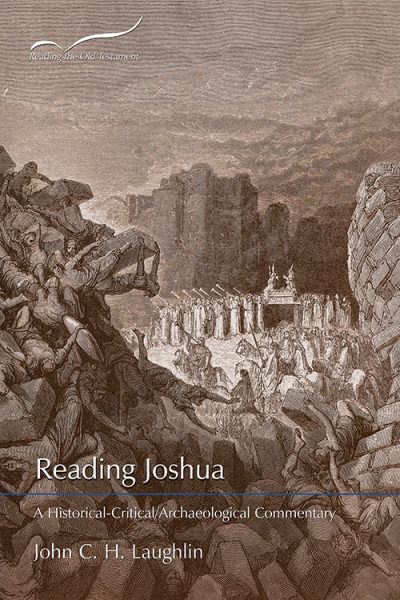
Reading the Old Testament: Reading Joshua (RtOT)
Reading Joshua was written for anyone who wishes to engage critically one of the most, if not the most, problematic and troublesome books in the Bible. Using the best of current historical-critical studies by mainstream biblical scholars, and the most recent archaeological discoveries and theorizing, Laughlin questions both the historicity of the stories presented in the book as well as the basic theological ideology presented through these stories: namely that Yahweh ordered the indiscriminate butchery of the Canaanites. This ideology is criticized for what it is: a xenophobic and genocidal approach to the issue of how human beings should act toward one another in a multi-cultural world. Read against the backdrop of the Babylonian Exile (sixth century BCE), these stories may have served well the purpose(s) of their author(s). Thus these troubling accounts may have had their time and place, but that time and place is not the twenty-first-century world in which we now find ourselves.
Reviews
"Authentic native of the Bible Belt, fully conversant with mainstream biblical scholarship, and experienced archaeologist, John Laughlin offers a new translation and refreshing no-nonsense commentary on one of the most troubling books of the Bible. He pulls no punches. For starters, he conveys and confirms the thinking of both mainstream biblical scholars and Palestinian archaeologists that the Joshua story of how the Israelites conquered Canaan and purged the land of its native population never really happened. And the really troubling thing for him is that the writers of Joshua 'have their god not only approving such actions but also ordering them in the first place.' - J. Maxwell Miller, Professor Emeritus, Emory University
"Laughlin has produced an unflinching critical commentary on the book of Joshua, basing his analysis on extensive research into the latest and best archaeological evidence. By adding a touch of 'moderate' postmodernism, he provides an analysis that places this book into its own historical and ideological context—without preconceived religious notions of what Joshua is 'supposed to say.' Laughlin gives us not only a critical commentary on the text, but also a critical commentary on the ideology that created the text. - Jeffrey A. Fager, Professor of Religion and Philosophy (ret.)
John C. H. Laughlin is Professor Emeritus of Religion at Averett University in Danville, Virginia. He earned a BA from Wake Forest and MDiv and PhD from the Southern Baptist Theological Seminary. A teacher for more than forty years, Laughlin specializes in the Jewish Scriptures, archaeology, and philosophy. He has served as a field supervisor for many seasons of archaeological field work in Israel, including at Tel Dan, Capernaum, Banias (Caesarea Philippi), and Kursi. He is the author of numerous articles and book reviews, and his own books include Archaeology and the Bible and Fifty Major Cities in the Bible.
Reading the Old Testament: Reading Judges (RtOT)
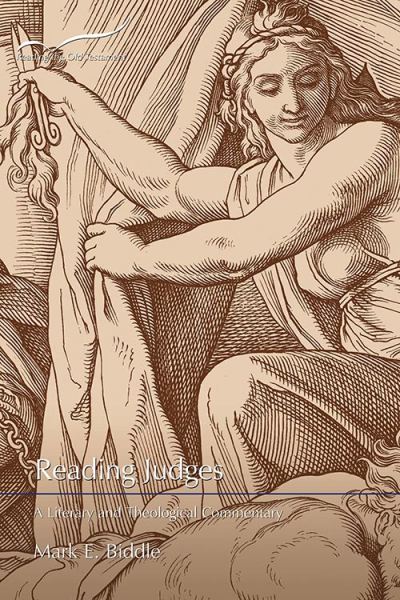
Reading the Old Testament: Reading Judges (RtOT)
Reading the Old Testament book of Judges presents a number of significant challenges related to social contexts, historical settings, and literary characteristics. Acknowledging and examining these difficulties provides a point of entry into the world of Judges and promises to enrich the reading experience.
How should we read the book of Judges? For several decades, biblical scholars have been debating the merits of two contrasting approaches to biblical interpretation: a synchronic approach, which attempts to see the text as a whole, as opposed to a diachronic approach, which asks questions about history and development of the text.
This commentary draws on historical-critical methods to shed light on this historic period and the role of Judges in Israel’s history. At the same time, Mark Biddle acknowledges that the relevance for modern reader lies in the text as a whole and not in the details of its developmental history.
Biddle tackles the kinds of issues (violence, patriarchy, tribalism) that may inhibit our ability to receive this text as inspired Scripture. This volume makes clear that the power of this biblical narrative derives in large part from its unvarnished portrayals of human foibles and failures—and of God’s steadfast commitment to relationship with humankind nonetheless.
Mark E. Biddle holds degrees from Samford University, the Southern Baptist Theological Seminary, Rueschlikon Baptist Theological Seminary, and the University of Zurich. In addition to editing the Reading the Old Testament series, he is the author of Deuteronomy in the Smyth & Helwys Bible Commentary series.
Reading the Old Testament: Reading Nahum - Malachi (RtOT)
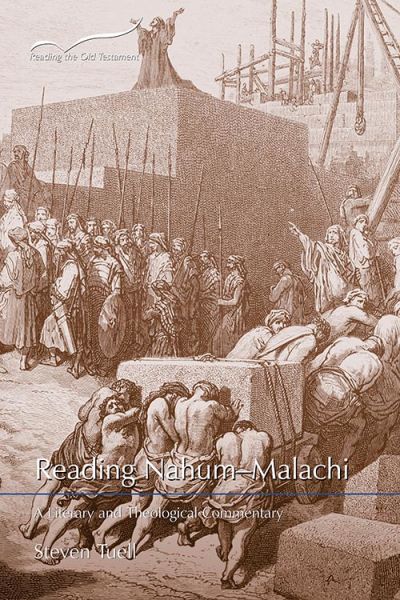
Reading the Old Testament: Reading Nahum - Malachi (RtOT)
Nahum–Malachi, the last six books of the Christian Old Testament, span the period from the end of the Assyrian empire in the 7th century BCE to the fall of the Neo-Babylonian Empire and the emergence of Persia in the 5th century BCE. But these books also have a collective identity as the latter half of the Book of the Twelve-the ancient Jewish and Christian designation for the so-called "minor" prophets. This commentary maintains a balance between reading each of these six books in its own historical and social setting and considering the interrelationships and canonical functions of these books within the Book of the Twelve as a whole. Jesus ben Sirach wrote that "the Twelve Prophets...comforted the people of Jacob and delivered them with confident hope" (Sir 49:10). This commentary, following ben Sirach, proposes that the theme of the Book of the Twelve is a comforting word of hope and deliverance.
Reviews
"Steven Tuell has written a lucid, concise, and informative commentary on the last six books of the Book of the Twelve Prophets. His commentary addresses historical, compositional, and theological issues in a manner that will be especially accessible for undergraduate and seminary students in Christian colleges, universities, and theological seminaries." — Marvin A. Sweeney, Claremont School of Theology and Academy for Jewish Religion
"Steven Tuell has addressed his considerable skill as a good reader of texts to the much neglected six “minor” prophets who close the Christian Old Testament. By his alert, steady attentiveness he shows why these neglected books merit attention, and why the neglect of them is a misfortune. Tuell’s reading is fresh, reliable, and suggestive. His commentary will be, in time to come, a substantial reference point for our continuing work and study." — Walter Brueggemann, Columbia Theological Seminary
"With admirable clarity and characteristically well-informed insight, Steven Tuell’s exegesis engages the historical particularity of the final six witnesses collected into the prophetical “Book of the Twelve.” Citing Sirach 49:10 as his mandate, he is also keenly attentive to the ways these individual voices contribute to the theological vitality of the book as a whole. In short, readers will appreciate that he achieves the balance he sets as his interpretative goal." — S. Dean McBride, Jr. Professor Emeritus of Biblical Hebrew and Old Testament Interpretation, Union Presbyterian Seminary Richmond, Virginia
"This well-written book by a leading scholar in prophetic literature is a welcome addition to the literature on the minor prophets. Both graduate students and pastors, especially, will appreciate the erudite discussions of issues of trans- mission, translation, and structure, coupled with a keen theological sense of how these texts speak to the world today." — Corrine Carvalho, Professor of Theology University of St. Thomas
Steven Tuell is the James A. Kelso Professor of Hebrew and Old Testament at Pittsburgh Theological Seminary, where he has taught since 2005. His research interests are biblical prophecy, particularly the book of Ezekiel and the Book of the Twelve, and the biblical literature of the early Persian Period. An ordained elder in The United Methodist Church, Tuell has served churches in Pennsylvania, New Jersey, West Virginia, and Virginia. He and his wife, Wendy, have three adult sons.
Reading the Old Testament: Reading Samuel (RtOT)
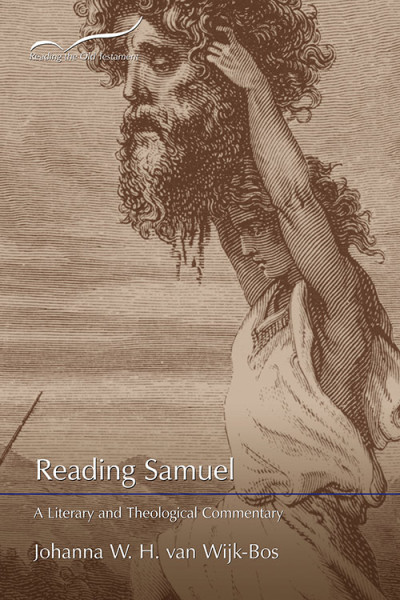
Reading the Old Testament: Reading Samuel (RtOT)
Interpreted masterfully by pre-eminent Old Testament scholar Johanna W. H. van Wijk-Bos, the story of Samuel touches on a vast array of subjects that comprise the rich fabric of human life. As it happens, in this volume we view ancient Israel in the era of Samuel, Saul and David. From parental yearning for their young to spousal and sibling relationships, these accounts entail far more than simply a recounting of the central characters lives and circumstances. The reader gains an inside look at royal intrigue, military campaigns, occult practices and the significance of religious objects of veneration.
Reviews
"Johanna W. H. van Wijk-Bos’ new commentary on 1-2 Samuel is elegantly written with the sensibility of a seasoned Old Testament scholar and the heart of a minister. She is sensitive to the theological and ethical issues regarding leadership raised by this sometimes difficult text and she also reflects on the women’s roles as few authors of commentaries have done before. This new volume in the Smyth & Helwys Reading the Old Testament series will be most helpful for preachers and teachers seeking a fresh word on familiar stories." — Alice Ogden Bellis, Professor of Old Testament Language & Literature, Howard University Divinity School, Washington, DC.
"The stories in 1 and 2 Samuel may seem an easy read, some of the easiest in the Bible. Johanna van Wijk-Bos leads us to read them slowly, notice the way the stories are told and the subtleties of their telling, and thus helps us derive much more from them than we might otherwise have gained. She helps us understand the dynamics of the stories and ponder the questions each one raises. Like the biblical books on which she comments on, her book invites and rewards careful, attentive reading." — John Goldingay, Professor of Old Testament, Fuller Theological Seminary, Pasadena, CA
"At times biblical commentators tend either to paraphrase the biblical text more or less or almost to lose themselves in technical details. In her fine commentary on the two books of Samuel, Johanna van Wijk-Bos elegantly avoids both these pitfalls. In this meticulously researched book, she is constantly in dialogue with other scholars. She skillfully informs the readers about the significance of many of the Hebrew words for places and people, without losing herself in details. Arguably, one of the most important challenges for contemporary biblical commentaries is to what extent they take gender studies into account. Unsurprisingly, the two books of Samuel provide van Wijk-Bos with ample possibilities to discuss various aspects of gender issues, and she does it succinctly and sophisticatedly. This is a rich and thought-provoking commentary, allowing the narrative to speak for itself." — Jesper Svartvik, Professor of Theology of Religions, Lund University, Lund, Sweden and the Swedish Theological Institute, Jerusalem
Johanna W. H. van Wijk-Bos is the Dora Pierce Professor of Bible and Professor of Old Testament at Louisville Presbyterian Theological Seminary. She holds degrees from Leiden University, The Netherlands (M.Div., M.Phil.) and Union Theological Seminary, New York (M.Phil, Ph.D.). Dr. Bos is an ordained minister in the Presbyterian Church (U.S.A.) and engages herself with issues of justice for women and disadvantaged groups locally and in the global arena. A pioneering woman in theological teaching, she was the only woman in 1976 to receive a doctorate from Union Theological Seminary in New York and the first woman to receive academic tenure at Louisville Seminary.
Edited by Mark E. Biddle, Russell T. Cherry Professor of Hebrew Bible/Old Testament at Baptist Theological Seminary at Richmond, the Reading the Old Testament commentary series presents cutting-edge biblical research in accessible language.
Reformation Commentary on Scripture: 1 Corinthians (RCS)
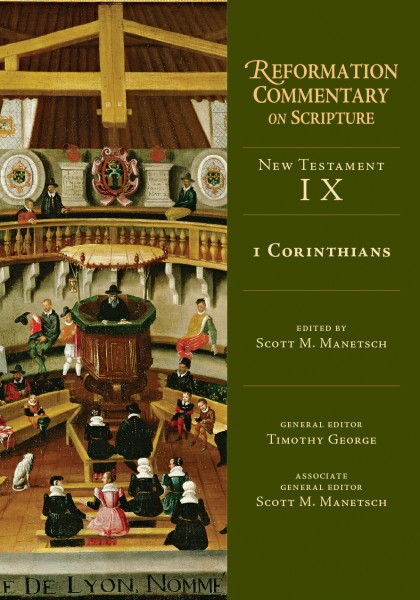
Reformation Commentary on Scripture: 1 Corinthians (RCS)
In his first letter to the church in Corinth, Paul writes, "I delivered to you as of first importance what I also received: that Christ died for our sins in accordance with the Scriptures, that he was buried, that he was raised on the third day in accordance with the Scriptures" (1 Cor 15:3-4 ESV).
Reflecting on Paul's summary of the gospel, sixteenth-century biblical commentator, theologian, and Lutheran pastor Tilemann Hesshus wrote, "The central tenet and foundation of our entire religion is that our Lord Jesus Christ died for our sins and rose again for our justification. All of our comfort, salvation and hope rest upon this foundation. From this is derived that greatest comfort concerning the resurrection of the dead and the future life of eternal glory."
Throughout the church's history, Christians have turned to the epistles of the Apostle Paul in order to understand the essentials of the Christian faith, learn from the challenges faced by early Christians, and discern how to navigate the complexities of following Christ. Among those who gained wisdom from Paul were the Protestant Reformers, who found inspiration and instruction about how to lead the church of their day during a time of significant theological debate, ecclesiastical reform, and spiritual renewal.
In this volume of the Reformation Commentary on Scripture, Scott Manetsch guides readers through a diversity of Reformation-era commentary on the first of Paul's letters to the Corinthians. Within this volume, readers will encounter familiar voices and discover lesser-known figures from a variety of theological traditions, including Lutherans, Reformed, Radicals, Anglicans, and Roman Catholics. Drawing on a variety of resources—including commentaries, sermons, treatises, and confessions—much of which appears here for the first time in English, it provides resources for contemporary preachers, enables scholars to better understand the depth and breadth of Reformation commentary, and helps all Christians cling to the things of first importance.
The Reformation Commentary on Scripture Series
The Reformation Commentary on Scripture (RCS) provides a crucial link between the contemporary church and the great cloud of witnesses that is the historical church. The biblical insights and rhetorical power of the tradition of the Reformation are here made available as a powerful tool for the church of the twenty-first century. Like never before, believers can feel they are a part of a genuine tradition of renewal as they faithfully approach the Scriptures.
In each RCS volume you will find the biblical text in English, from the English Standard Version (ESV), alongside the insights of the leaders of the Reformation. Hear from landmark figures such as Luther and Calvin, as well as lesser-known commentators such as Peter Martyr Vermigli, Johannes Oecolampadius, Martin Bucer, Johannes Brenz, Caspar Cruciger, Giovanni Diodati, and Kaspar Olevianus. The series introduces you to the great diversity that constituted the Reformation, with commentary from Lutheran, Reformed, Anglican, Anabaptist and even reform-minded Catholic thinkers, who all shared a commitment to the faithful exposition of Scripture.
Each volume is designed to facilitate a rich research experience for preachers and teachers, and contains a unique introduction written by the volume editor, providing a reliable guide to the history of the period, the unique reception of the canon of Scripture and an orientation to the thinkers featured in the volume. Many of these texts are being published in English for the first time, and volumes also contain biographies of figures from the Reformation era, adding an essential reference for students of church history.
Reformation Commentary on Scripture: 1-2 Samuel, 1-2 Kings, 1-2 Chronicles (RCS)
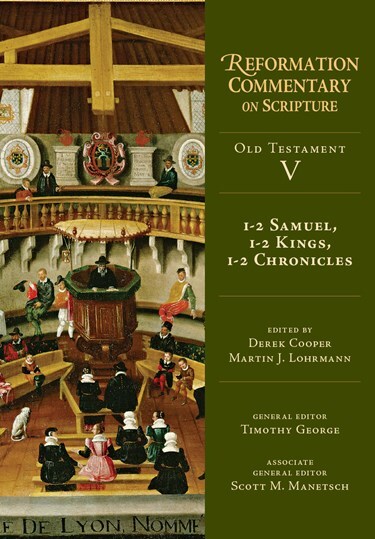
Reformation Commentary on Scripture: 1-2 Samuel, 1-2 Kings, 1-2 Chronicles (RCS)
'Then David said to the Philistine, 'You come to me with a sword and with a spear and with a javelin, but I come to you in the name of the LORD of hosts.'' (1 Samuel 17:45)
Reflecting upon David's victory over Goliath, Reformation translator, theologian and commentator William Tyndale compared it to Christ's victory over sin and death: 'When David had killed Goliath the giant, glad tidings came to the Israelites that their fearful and cruel enemy was dead and that they were delivered out of all danger. For this gladness, they sang, danced and were joyful. In like manner, the good news or 'gospel' of God is joyful tidings.'
The books of 1-2 Samuel, 1-2 Kings and 1-2 Chronicles, which record the history of Israel from the prophetic ministry of Samuel to the fall of Jerusalem, provided the reformers with some of the best-known narratives of the Old Testament upon which to comment, including Hannah's prayer, the anointing of Saul as Israel's first king, David's triumph over Goliath and his later adultery with Bathsheba, Solomon's building of the Temple, Elijah's challenge to the prophets of Baal, and the healing of Naaman.
For the reformers, these stories were not merely ancient Israelite history, but they also foreshadowed the coming of Jesus Christ, and they had immediate relevance for their lives and the church of their day. Thus, Anglican exegete John Mayer perceived within King Josiah's reform of Israelite worship after the discovery of the Book of the Law a prefiguration of 'what should be done in the latter days of the gospel, in which a greater reformation of the religion is now being made.'
In this Reformation Commentary on Scripture volume, Derek Cooper and Martin Lohrmann guide readers through a diversity of Reformation commentary on these historical books. Here, readers will find reflections from both well-known voices and lesser-known figures from a variety of confessional traditions—Lutherans, Reformed, Radicals, Anglicans and Roman Catholics—many of which appear in English for the first time. By drawing upon a variety of resources—including commentaries, sermons, treatises and confessions—this volume will enable scholars and students to understand better the depth and breadth of Reformation-era insights on Scripture. It will also provide resources for contemporary preachers, and encourage all those who continually seek to share the 'joyful tidings' of Jesus Christ.
The Reformation Commentary on Scripture Series
The Reformation Commentary on Scripture (RCS) provides a crucial link between the contemporary church and the great cloud of witnesses that is the historical church. The biblical insights and rhetorical power of the tradition of the Reformation are here made available as a powerful tool for the church of the twenty-first century. Like never before, believers can feel they are a part of a genuine tradition of renewal as they faithfully approach the Scriptures.
In each RCS volume you will find the biblical text in English, from the English Standard Version (ESV), alongside the insights of the leaders of the Reformation. Hear from landmark figures such as Luther and Calvin, as well as lesser-known commentators such as Peter Martyr Vermigli, Johannes Oecolampadius, Martin Bucer, Johannes Brenz, Caspar Cruciger, Giovanni Diodati, and Kaspar Olevianus. The series introduces you to the great diversity that constituted the Reformation, with commentary from Lutheran, Reformed, Anglican, Anabaptist and even reform-minded Catholic thinkers, who all shared a commitment to the faithful exposition of Scripture.
Each volume is designed to facilitate a rich research experience for preachers and teachers, and contains a unique introduction written by the volume editor, providing a reliable guide to the history of the period, the unique reception of the canon of Scripture and an orientation to the thinkers featured in the volume. Many of these texts are being published in English for the first time, and volumes also contain biographies of figures from the Reformation era, adding an essential reference for students of church history.
Reformation Commentary on Scripture: 1-2 Thessalonians, 1-2 Timothy, Titus, Philemon (RCS)
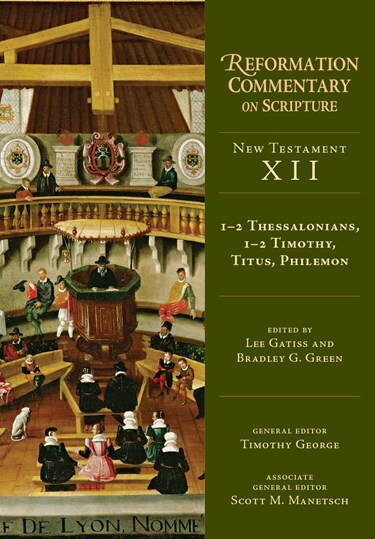
Reformation Commentary on Scripture: 1-2 Thessalonians, 1-2 Timothy, Titus, Philemon (RCS)
"Since we believe that Jesus died and rose again, even so, through Jesus, God will bring with him those who have fallen asleep." (1 Thess 4:14).
The epistles of the New Testament provide unparalleled insight into the realities of the life of the early church, guidance for those called to lead the church, and comfort in the face of pressing theological questions. Among those letters are 1 and 2 Thessalonians, which address questions about the expected return of Christ, the pastoral epistles of 1 and 2 Timothy and Titus, written to two of Paul's coworkers who were overseeing early churches, and Philemon, which concerns the relationship between a slave and his master.
The Protestant Reformers of the sixteenth century also found wisdom and guidance in these letters. For example, Martin Luther reminded the Christians of his day that Paul had encouraged believers "not to sorrow over the dead as others who have no hope, but to comfort each other with God's Word as having a certain hope of life and of the resurrection of the dead."
In this volume of the Reformation Commentary on Scripture, Lee Gatiss and Bradley Green guide readers through a diversity of early modern commentary on the epistles of 1 and 2 Thessalonians, 1 and 2 Timothy, Titus, and Philemon. Readers will hear from familiar voices and discover lesser-known figures from a variety of theological traditions, including Lutherans, Reformed, Radicals, Anglicans, and Roman Catholics. Drawing upon a variety of resources—including commentaries, sermons, treatises, and confessions—much of which appears here for the first time in English, this volume provides resources for contemporary preachers, enables scholars to better understand the depth and breadth of Reformation commentary, and seeks to bring guidance and comfort in the midst of today's challenges.
The Reformation Commentary on Scripture Series
The Reformation Commentary on Scripture (RCS) provides a crucial link between the contemporary church and the great cloud of witnesses that is the historical church. The biblical insights and rhetorical power of the tradition of the Reformation are here made available as a powerful tool for the church of the twenty-first century. Like never before, believers can feel they are a part of a genuine tradition of renewal as they faithfully approach the Scriptures.
In each RCS volume you will find the biblical text in English, from the English Standard Version (ESV), alongside the insights of the leaders of the Reformation. Hear from landmark figures such as Luther and Calvin, as well as lesser-known commentators such as Peter Martyr Vermigli, Johannes Oecolampadius, Martin Bucer, Johannes Brenz, Caspar Cruciger, Giovanni Diodati, and Kaspar Olevianus. The series introduces you to the great diversity that constituted the Reformation, with commentary from Lutheran, Reformed, Anglican, Anabaptist and even reform-minded Catholic thinkers, who all shared a commitment to the faithful exposition of Scripture.
Each volume is designed to facilitate a rich research experience for preachers and teachers, and contains a unique introduction written by the volume editor, providing a reliable guide to the history of the period, the unique reception of the canon of Scripture and an orientation to the thinkers featured in the volume. Many of these texts are being published in English for the first time, and volumes also contain biographies of figures from the Reformation era, adding an essential reference for students of church history.
Lee Gatiss (PhD, Cambridge) is the director of Church Society and a lecturer in church history at Union School of Theology. He is the author of several books, including Light After Darkness: How the Reformers Regained, Retold, and Relied On the Gospel of Grace and Cornerstones of Salvation: Foundations and Debates in the Reformed Tradition. He is also the editor of The NIV Proclamation Bible, The Sermons of George Whitefield, and a number of books on Puritanism and Anglicanism.
Bradley G. Green (PhD, Baylor University) is associate professor of Christian studies at Union University. He is the author of Covenant and Commandment, The Gospel and the Mind: Recovering and Shaping the Intellectual Life, and Colin Gunton and the Failure of Augustine as well as the editor of Shapers of Christian Orthodoxy.
Reformation Commentary on Scripture: 2nd Corinthians (RCS)
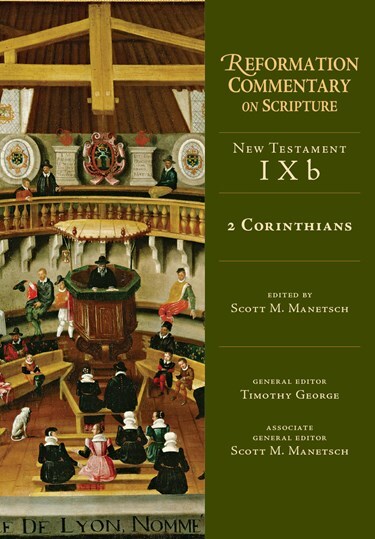
Reformation Commentary on Scripture: 2nd Corinthians (RCS)
"Therefore, if anyone is in Christ, he is a new creation. The old has passed away; behold, the new has come."
When the Reformers of the sixteenth century turned to this biblical text, originally written by Paul to the first-century church in Corinth, they found truths that apply to Christians regardless of their historical context. For example, Reformed theologian Wolfgang Musculus wrote, "To be a Christian is to be in Christ. If anyone is outside of Christ, he is not a Christian. It is easy to partake of the sacraments and to be of the name and profession of Christ, but that is not what it means to be in Christ... The largest part of Christians is still an old creature for they have not yet been regenerated and renewed by the spirit of Christ. To know a Christian, therefore, we should not so much examine his external profession, but his life."
In this volume of the Reformation Commentary on Scripture, Reformation scholar Scott Manetsch guides readers through a wealth of early modern commentary on the book of 2 Corinthians. Readers will hear from familiar voices and discover lesser-known figures from a diversity of theological traditions, including Lutherans, Reformed, Radicals, Anglicans and Roman Catholics. Drawing upon a variety of resources—including commentaries, sermons, treatises, and confessions—much of which appears here for the first time in English, this volume provides resources for contemporary preachers, enables scholars to better understand the depth and breadth of Reformation commentary, and seeks to encourage all those who would be newly created in Christ.
The Reformation Commentary on Scripture Series
The Reformation Commentary on Scripture (RCS) provides a crucial link between the contemporary church and the great cloud of witnesses that is the historical church. The biblical insights and rhetorical power of the tradition of the Reformation are here made available as a powerful tool for the church of the twenty-first century. Like never before, believers can feel they are a part of a genuine tradition of renewal as they faithfully approach the Scriptures.
In each RCS volume you will find the biblical text in English, from the English Standard Version (ESV), alongside the insights of the leaders of the Reformation. Hear from landmark figures such as Luther and Calvin, as well as lesser-known commentators such as Peter Martyr Vermigli, Johannes Oecolampadius, Martin Bucer, Johannes Brenz, Caspar Cruciger, Giovanni Diodati, and Kaspar Olevianus. The series introduces you to the great diversity that constituted the Reformation, with commentary from Lutheran, Reformed, Anglican, Anabaptist and even reform-minded Catholic thinkers, who all shared a commitment to the faithful exposition of Scripture.
Each volume is designed to facilitate a rich research experience for preachers and teachers, and contains a unique introduction written by the volume editor, providing a reliable guide to the history of the period, the unique reception of the canon of Scripture and an orientation to the thinkers featured in the volume. Many of these texts are being published in English for the first time, and volumes also contain biographies of figures from the Reformation era, adding an essential reference for students of church history.
Scott M. Manetsch (PhD, University of Arizona) is professor of church history at Trinity Evangelical Divinity School. He is the associate general editor of the Reformation Commentary on Scripture and the author of Calvin's Company of Pastors: Pastoral Care and the Emerging Reformed Church, 1536-1609.
Reformation Commentary on Scripture: Acts (RCS)
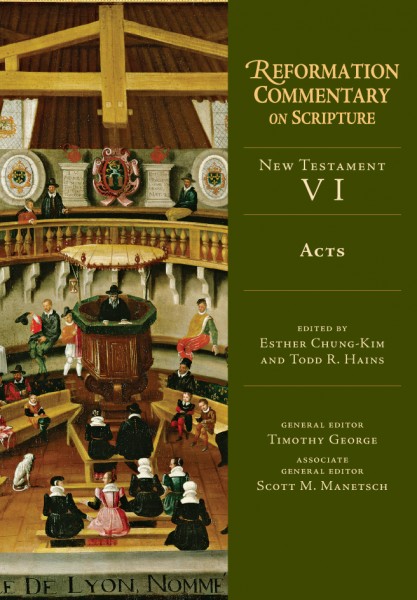
Reformation Commentary on Scripture: Acts (RCS)
The Reformation was a call to return with renewed vigor to the biblical roots of Christian faith and practice. Still, for the Reformers, the truth of the Bible could never be separated from the true community of God's people gathered by his Word. In the book of Acts, they found God's blueprint for how the church should participate with the Holy Spirit in accomplishing his purposes in the world.
In the latest Reformation Commentary on Scripture, we watch as the diverse streams of the Protestant movement converge on the book of Acts. As we return with the Reformers to this vision of Spirit-filled community, we are given a lesson in the nature of biblical reform from those who bore it out for the first time. Authors Esther Chung-Kim and Todd R. Hains present a vivid portrait of the Reformers? views on the contemporary church?s faithfulness to its God-given identity and calling.
The Reformers approached the narrative account of the early church in the book of Acts from diverse viewpoints. Commentators like John Calvin and the Swiss Reformed Heinrich Bullinger elaborated on the theological implications of the text with a great deal of historical detail. Others like reform-minded Catholic Johann Eck evoked episodes in Acts in response to pressing concerns of the day. Sermons upheld notable characters in Acts such as Peter, Stephen, Paul, Lydia and Apollos as examples of robust faith and of life in Christian community. Anabaptists in their apologetic works focused heavily on the necessity of believer's baptism.
The commentators' interactions range from irate disagreement to irenic concord, but all exhort their readers not to dissolve "the holy knot" of the plain history of Christ's works and their lasting fruits. For them, Acts is certainly history, but it cannot be mere history.
The Reformation Commentary on Scripture Series
The Reformation Commentary on Scripture (RCS) provides a crucial link between the contemporary church and the great cloud of witnesses that is the historical church. The biblical insights and rhetorical power of the tradition of the Reformation are here made available as a powerful tool for the church of the twenty-first century. Like never before, believers can feel they are a part of a genuine tradition of renewal as they faithfully approach the Scriptures.
In each RCS volume you will find the biblical text in English, from the English Standard Version (ESV), alongside the insights of the leaders of the Reformation. Hear from landmark figures such as Luther and Calvin, as well as lesser-known commentators such as Peter Martyr Vermigli, Johannes Oecolampadius, Martin Bucer, Johannes Brenz, Caspar Cruciger, Giovanni Diodati, and Kaspar Olevianus. The series introduces you to the great diversity that constituted the Reformation, with commentary from Lutheran, Reformed, Anglican, Anabaptist and even reform-minded Catholic thinkers, who all shared a commitment to the faithful exposition of Scripture.
Each volume is designed to facilitate a rich research experience for preachers and teachers, and contains a unique introduction written by the volume editor, providing a reliable guide to the history of the period, the unique reception of the canon of Scripture and an orientation to the thinkers featured in the volume. Many of these texts are being published in English for the first time, and volumes also contain biographies of figures from the Reformation era, adding an essential reference for students of church history.






- Adapt your commentary collection month-to-month based on the book or books you are studying.
- Build your commentary library strategically without hundreds of dollars of upfront investment.
- Never get stuck with commentaries you rarely use - swap them out each month as your needs change.



